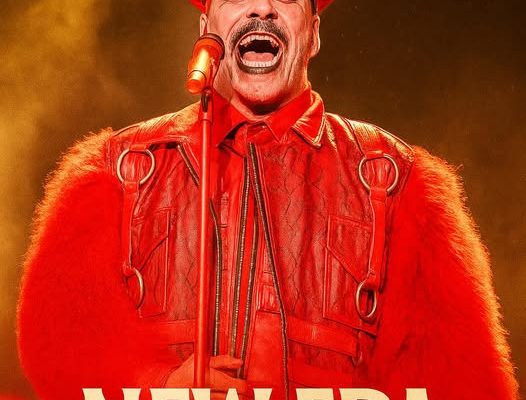Netflix has long been known for pushing boundaries with documentaries that peel back the curtain on the world’s most enigmatic figures and controversial subjects, and now the streaming giant is preparing to release one of its most daring projects to date. On September 25, Netflix will officially premiere It’s Time, a bold and unfiltered documentary that promises to deliver the untold story of Rammstein, one of the most polarizing and provocative bands in modern music history. This announcement has already sent waves across both the music world and the entertainment industry at large, as fans and critics alike prepare themselves for a no-holds-barred deep dive into a band that has built its reputation on defiance, spectacle, and controversy.
Rammstein’s story is not one of conventional success. Emerging from post-Cold War Germany, the group developed a sound and image that challenged musical and cultural norms while embodying an industrial aggression that made them stand out not just in Europe but across the globe. What has always separated Rammstein from countless other bands has been their unwavering commitment to theatricality and performance. Fire, pyrotechnics, shocking lyrics, and provocative stage presence have been signatures of their work, making them both beloved by diehard fans and consistently criticized by outsiders. Yet despite polarizing opinions, Rammstein has endured for decades, building a legacy that cannot be ignored. Netflix’s decision to take on this story signifies a recognition of the cultural weight carried by the band, as well as the intrigue surrounding their personal lives and artistic vision.
It’s Time is not just a title—it’s a statement. Netflix is positioning the documentary as a reckoning, a moment where the band’s legacy will be presented in its most raw and unflinching form. According to early reports, the film promises to weave together never-before-seen archival footage, intimate interviews with the band members, and commentary from cultural critics and collaborators who have witnessed the Rammstein phenomenon firsthand. What makes this project particularly fascinating is its commitment to exploring not only the band’s music but also the cultural and political contexts that shaped them.
Rammstein emerged in 1994, a period when Germany was still grappling with reunification and redefining its identity after decades of division. The band’s style—aggressive, unapologetic, and unorthodox—captured the frustrations and complexities of a society in flux. Their music became a vehicle for expression that spoke to themes of pain, rebellion, love, and destruction. With songs that often challenged taboos and blurred the line between art and shock value, they quickly drew both massive audiences and significant controversy. Netflix’s documentary is expected to explore these tensions, shedding light on how Rammstein navigated accusations of political extremism, censorship battles, and criticism from mainstream outlets, while simultaneously selling out stadiums and garnering a fanbase that spans generations.
The announcement of It’s Time has been framed as more than just a documentary premiere—it’s being described as a new era in storytelling for Netflix. The platform has established a strong reputation for music documentaries, from Beyoncé’s Homecoming to Taylor Swift’s Miss Americana, but the Rammstein project represents a different kind of challenge. This is not about mainstream pop stardom or celebrity relatability; it is about confronting controversy head-on and amplifying the voices of artists who have made careers out of provocation. In many ways, Rammstein is the perfect subject for such a bold approach. Their concerts, often labeled as both awe-inspiring and deeply disturbing, symbolize a refusal to compromise artistry for comfort. That spirit aligns perfectly with Netflix’s current push to attract global audiences with content that dares to be different.
The build-up to the September 25 release has already begun, with fan communities buzzing on social media platforms and speculating about what the documentary might reveal. Some fans hope for a closer look at the creative process behind Rammstein’s legendary stage shows, particularly the mechanics and artistry of their pyrotechnics. Others anticipate a more personal angle, delving into the relationships among band members who have performed together for decades with surprising stability compared to many of their contemporaries. Rumors suggest the documentary will address some of the controversies that have followed the band, from the explicit nature of their lyrics to allegations that have surfaced in recent years. By tackling these issues openly, Netflix appears ready to embrace the unfiltered truth, regardless of how uncomfortable it may be.
For Netflix, timing is everything. Launching It’s Time at the tail end of September allows the streaming platform to capitalize on the lead-up to fall, when audiences typically crave darker, more intense storytelling. The decision also reflects an awareness of the cultural climate: with global conversations about freedom of expression, censorship, and the role of art in society growing more heated, Rammstein’s story provides a case study in how artists walk the fine line between provocation and responsibility.
The documentary’s title also speaks to a sense of inevitability. For decades, Rammstein’s story has been whispered about, partially revealed in interviews or hinted at through their music, but never fully unpacked in one definitive project. Now, as the band approaches three decades of existence, Netflix is offering fans and skeptics alike the chance to experience the complete narrative. It’s Time suggests not just the moment for Rammstein to tell their story, but also the cultural readiness of audiences to hear it without censorship or dilution.
Critics will inevitably scrutinize the project, and perhaps that is part of the point. Documentaries about polarizing figures often invite debates about bias, representation, and whether certain narratives are glorified or condemned. In Rammstein’s case, those debates are unavoidable. The band has never been one to shy away from controversy, and if Netflix remains true to its promise of boldness and honesty, It’s Time could reignite conversations about art, morality, and the role of music in shaping social consciousness.
Another compelling aspect of the upcoming release is the opportunity to contextualize Rammstein within the broader history of heavy music. Industrial metal has always lived at the fringes of mainstream culture, often overshadowed by more commercially viable genres. Yet Rammstein has defied expectations, not only surviving but thriving, selling millions of albums worldwide and performing to sold-out crowds across continents. The documentary promises to shed light on how they achieved such longevity and influence, particularly in an industry notorious for its volatility.
Fans will likely see the documentary as a celebration as much as a revelation. For those who have followed Rammstein since their early days, It’s Time represents recognition of the band’s status as cultural icons, even if unconventional ones. For newer audiences, especially those who may know the band only by reputation, the film will serve as an introduction to the artistry and vision that has sustained them. In either case, the September 25 premiere is shaping up to be an event, not just another addition to Netflix’s catalog.
What makes this project resonate even more is the notion that Rammstein’s journey is not finished. Unlike documentaries that reflect on artists no longer active, It’s Time captures a band still performing, still evolving, and still sparking debates. This lends the project an immediacy and relevance that feels rare in music documentaries. It is not just about legacy; it is about the present and the future.
In the weeks leading up to the release, Netflix is expected to roll out trailers, teasers, and promotional content that will likely highlight the documentary’s provocative tone. If early descriptions are accurate, audiences should expect imagery that mirrors the band’s dark theatrical style—stark visuals, intense soundscapes, and moments designed to unsettle as much as enlighten. The marketing itself will likely be part of the spectacle, designed to draw attention and spark conversation before the film even premieres.
Ultimately, the announcement of It’s Time reflects a larger trend in entertainment: audiences are no longer satisfied with sanitized, one-dimensional portrayals of artists. There is a hunger for authenticity, even when that authenticity is uncomfortable. Netflix has positioned itself at the forefront of this movement, and by focusing on Rammstein, it is making a bold bet that honesty and controversy can drive engagement just as effectively as glamour and celebrity.
When September 25 arrives, fans will finally see whether It’s Time delivers on its promise. But regardless of how the documentary is received, one thing is certain: Rammstein’s story is too big, too influential, and too controversial to be ignored any longer. By bringing it to the world stage through Netflix, the band’s legacy will be cemented in a way that goes beyond music and performance. It will become part of the global cultural conversation, forcing viewers to reckon with questions about art, freedom, and the power of music to both provoke and unite.
In the end, It’s Time is not just the title of a documentary—it is a declaration that Rammstein’s moment of full exposure has arrived. For fans, critics, and curious onlookers, September 25 marks the beginning of a new era, one in which the band’s untold story will finally be told, and perhaps understood in ways it never has been before. Netflix’s bold move ensures that this won’t just be another release; it will be an event, one destined to leave a lasting impact on music history and documentary filmmaking alike.



